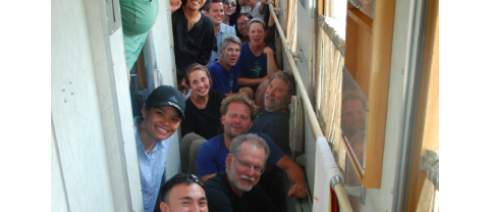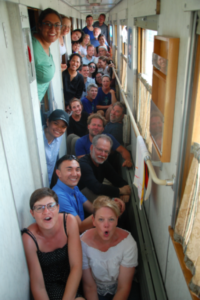
Mongolia 2018 Reflection: Managing Expectations (Margarida Ferreira)
When leaving for a mission, one can never accurately guess what challenges the team will face. The mission to heal in Mongolia was no exception in this regard.
Managing the expectations for the mission versus the reality of the work we were required to do (and the small surgical workload) I believe was one of the biggest personal and collective challenges we faced.
The first days were spent screening patients, we expected mostly surgical cases to show up but were surprised to encounter few patients requiring surgical treatment and an overwhelming proportion of patients looking for primary care, treatment of chronic conditions, and patients looking for advice on examination results.
We came to the unexpected realization that most patients seemed to have an easier access to sophisticated exams like MRIs and CT scans than to medical advice on the findings of these exams or treatment plans on prevalent conditions such as arterial hypertension and obesity.
Performing minor surgical procedures outside the main hospital in Ulaanbaatar was also a challenge due to basic surgical tools lacking in most of the outpatient clinics we visited.
Another challenge was the need to adapt to a relatively stiff and hierarchical system where the decision-making processes are slower and different from what we’re used to, leaving less room for personal initiative.
One thing I did enjoy throughout the whole mission was the various teaching moments we had. The interaction and discussion with medical peers both more and less experienced than you is definitely one of the mission’s highlights.
This discussion and exchange were further enriched by the presence of people with different professional backgrounds and to me as a medical professional it was inspiring to take a look at the same environment and population through their eyes and learn about the potential and opportunities for healthcare improvement they saw.
Getting the local staff to acknowledge the value of teaching interactions and getting them to join the teaching sessions, however, was a lot harder.
Regarding the time we spent in the railway central hospital in UB I was surprised to find tools of our everyday practice such as X-ray and CT-scans coexist with wards dedicated to physical rehabilitation, gymnastics, acupuncture, facilities for cupping and massage. Here, nurses clearly outnumber doctors and they are often in charge of providing various treatments. Discussing this reality with the local doctors I learned about the striking lack of specialist doctors in most medical specialties on a national level.
It was impressive to notice that dental care was considered a just as relevant part of health care as other medical conditions and the resources and staff for it were also available in the hospital.
In the operating rooms the older, reusable material coexists with modern equipment such as laparoscopy tools, as a good reminder of the waste and costs implied in the disposable OR materials that are the rule back at home.
On what concerns the medical conditions we encountered it’s worth mentioning that joining a mission will likely mean you will need to step out of your comfort zone as a doctor and will need to care for patients with conditions somewhat outside your daily practice. It was indeed rewarding to consult patients with conditions one rarely sees at home, such as Bell’s palsy, brucellosis arthritis as well as the conditions that result from the specific patterns of epidemiology of the population: one of these examples is the very high prevalence of hepatitis B and C in Mongolia and the consequent high prevalence of hepatocellular carcinoma.
One of the brighter sides of the mission was the interpersonal relationships we established, how easily the whole team got set to work together and how smoothly all of us shared two small train carriages for more than 10 days. It was a remarkable experience and the mission ended with a long list of new friends, promises for globetrotting visits, and for meeting up in upcoming missions.
As a final note, I would say that for me the biggest lesson learned with this mission was handling my expectations and the ability to adapt to the resources and opportunities set in front of us in order to be able to use them to make a difference despite the fact they’re not the ones you expected or preferred.
